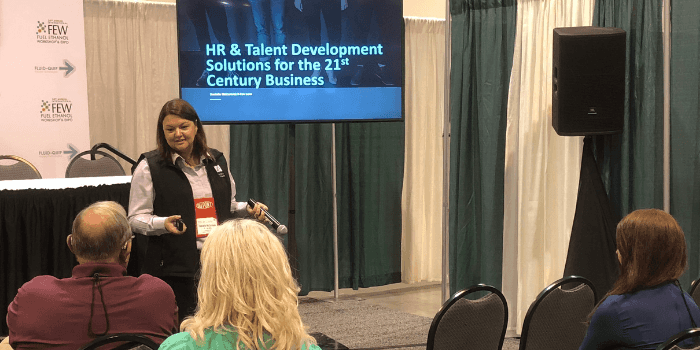Leaders within the Biofuels industry are some of the most innovative individuals we work with. They are at the cusp of new technologies and set the bar for many industries when benchmarking efficiency and creative problem solving. Because the industry attracts innovative leaders, it’s surprising to see how little focus is spent on innovating in the area of people. Most of the HR and management systems currently used have been in practice for decades – despite lackluster results. The proof of this is the struggle to retain talent in an already-tight labor market.
The time has come to shake up your HR practices and bring them into this century. The benefits to your company come in the form of increased productivity and efficiencies, employee engagement, talent retention, emerging leaders, cost-saving solutions, process improvements, and client satisfaction…to name a few. Advantages like these would provide a competitive edge for any business, and are essential for a business’ growth and survival in today’s marketplace.
How Does Your Company Rate?
“You’re perfectly aligned to get the results you’re currently getting!” I love this quote from Stephen Covey and I think of it so often in the work we do with our ethanol and biofuels clients. We’ve learned that at any time we have a consistent result, good or bad, it’s because we have a great system to get us there. A few questions worth asking yourselves:
-
As a leader, are you getting the employee performance results you want?
-
Is your culture one that is thriving?… are your employees volunteering their best, or do you feel as though constant management is required to get even a mediocre performance from your teams?
-
Do you find yourself doing the “head slap” out of frustration and disappointment that your leaders still aren’t leading at the level you need them to?
-
Do you struggle to attract and retain employees?
The good (and bad) news is that if you said yes to any of those questions, you’ve got a great system in place if you want to maintain your current results. However, if you see room for improvement, you will want to evaluate three key areas: talent development, training and coaching, and HR capacity.
Here, we’ll focus on talent development, and some easy fixes that can increase employee engagement, empowerment, productivity, and long-term commitment.
Talent Development – A Little TLC Goes a Long Way
Studies show that both employees and their supervisors are underwhelmed and disappointed following traditional performance evaluations – even when the evaluation is very favorable. The reason is simple: the systems most companies use today are decades-old and out-of-touch when compared with methods that encourage and create employee satisfaction.
Traditional evaluations typically use ratings-based scales (rating competencies on a sliding scale from one to five. This forces an employee to confirm whether or not they are good at their job. A rating of four, for example, might leave many disappointed that they didn’t earn a five, and most of the time feel that they should have (especially when that rating is tied to compensation).
Additionally, the way in which this system communicates to employees what they are doing well and areas for improvements can be vastly improved upon so that the employees feel encouraged, engaged, and supported. The use of older rating systems typically result in supervisors spending hours preparing the ratings and support documentation, but struggling to have a truly meaningful discussion with their employees. New methods alleviate these issues.
Performance Reviews that Address 21st Century Challenges
Here are several ways to positively impact the way you are reviewing and supporting employee performance:
- Replace Annual Ratings with Talent Development Discussions
There is a new type of conversation happening when companies discuss performance. Rather than once or twice per year evaluations, the new method centers around the continuous development of the employees on a quarterly basis, and the discussions are driven by the employees.
Additionally, companies are now offering over-the-shoulder coaching throughout the review period to encourage and foster personal career growth, satisfaction, and leadership skills.
- Implement a New Approach to Feedback Systems
The greatest challenge with feedback systems is that we ask way too many questions – and the evaluator is left spending time completing long surveys that often don’t get at the heart of what matters most.
It’s critical that employees know where they stand on a more regular basis, and if they are failing to meet expectations or project competencies throughout their jobs. In a tight labor market it is especially tough to lose trained talent. The more frequent feedback approach allows time to try to remedy the situation – with potential to train or coach the employee during the project, rather than waiting until a performance evaluation to deliver the news about failures.
Companies are moving to a simple three-part question to gather feedback: “What should I stop, start, and continue doing?” This allows focus on the task or issue at hand, and works on a project-by-project basis or as an overall performance approach.
Making a small investment in fulfilling the needs of your human resources team now, can pay off as a large dividend in securing company’s people, culture, productivity, growth, and survival.
Should you have any questions about these approaches and their implementation, feel free to reach out to the HR Solutions team.
Danielle McCormick is a principal and functional leader for the Human Resources external consultancy team which provides expertise and HR service solutions for businesses. Contact her at Danielle.mccormick@pinionglobal.com, or visit https://www.pinionglobal.com/services/hr-solutions/ for more information.





